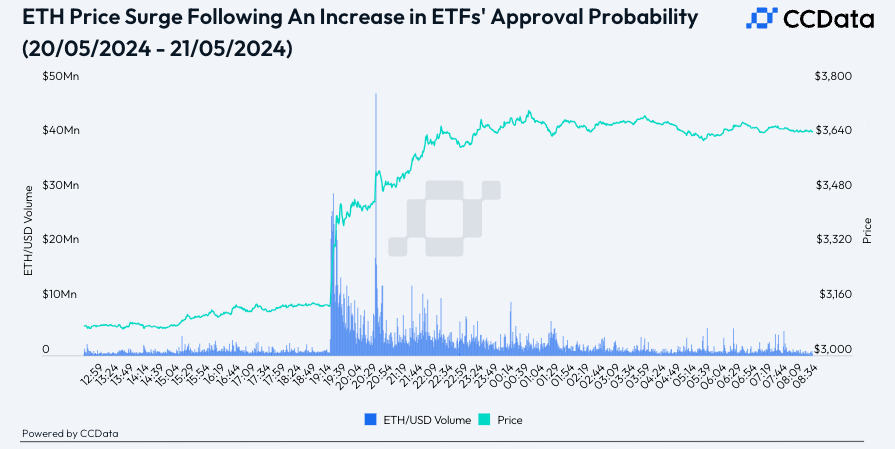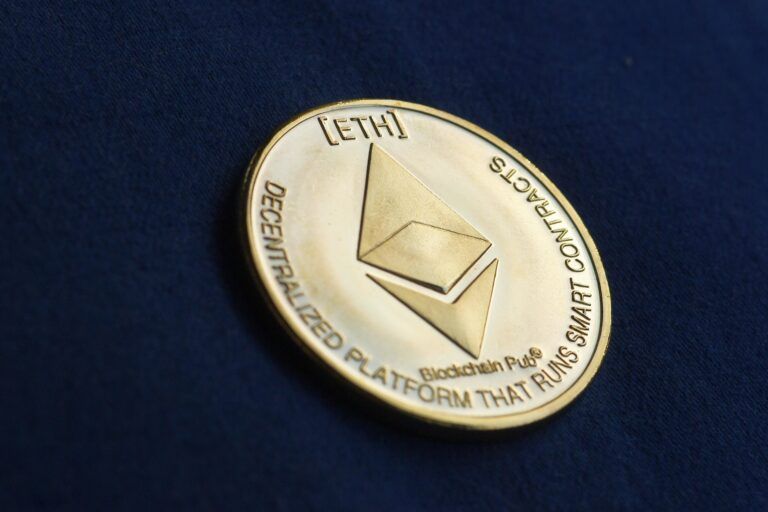The U.S. Securities and Exchange Commission (SEC) has signaled a potential shift in its approach to spot Ethereum ETFs.
According to a recent blog post by the CCData Research team, the SEC has requested stakeholders to update their 19b-4 filings, suggesting that the approval of these long-awaited investment vehicles might be on the horizon.
The news has triggered a seismic shift in the market, with Ethereum experiencing an unprecedented surge in price, trading volume, and open interest.

CCData reports that Ethereum recorded its largest daily gain in market capitalization, as investors scrambled to position themselves for the potential approval of spot ETFs. The discount on Grayscale Ethereum Trust (ETHE) relative to its Net Asset Value (NAV) also decreased significantly from 20.5% to 11.8%, indicating a resurgence of investor confidence in Ethereum.
The race for the first spot Ethereum ETF is now in full swing, with nine participants vying for the coveted approval. As noted by the CCData, VanEck, ARK/21Shares, and Hashdex have applications with final decision deadlines approaching later this month, while BlackRock’s iShares Ethereum Trust awaits a decision set for June 8. The SEC is likely to issue approvals simultaneously to avoid giving any single applicant an early advantage. Coinbase has emerged as the popular choice for custodian among the applicants.
However, CCData highlights a crucial decision by the SEC that could have significant implications for investors. The regulatory body has decided to prohibit staking in the initial ETFs, meaning that entities holding potential ETH ETFs will miss out on the annual yield from Ethereum staking. A hypothetical scenario presented by CCData illustrates the substantial difference in returns between holding native Ether with staking rewards and holding an ETF without staking over a ten-year period, emphasizing the potential losses investors could face.
Despite Ethereum’s recent struggles in terms of trading activity on centralized exchanges and on-chain activity compared to other altcoins and Layer 2 solutions, the approval of spot ETH ETFs could breathe new life into the Ethereum ecosystem. CCData suggests that the increased network usage, coupled with Ethereum’s deflationary supply mechanism, may lead to favorable supply dynamics and propel the price of Ethereum to new heights.
Drawing from the CCData Research team’s analysis, the potential inflows for Ethereum ETFs could be substantial, assuming they can attract a portion of the funds that have flowed into Bitcoin ETFs. A linear regression analysis by CCData suggests that a significant shift in funds could result in a 30% appreciation in Ethereum’s price within the next 100 days. However, the team also notes that Ethereum might face short-term struggles due to outflows from Grayscale Ethereum Trust, similar to what was observed after the approval of spot Bitcoin ETFs.
The CCData Research team also delves into the unique factors that could potentially impact ETH ETF net flows and prices, such as orderbook liquidity, deflationary supply mechanism, staked supply, and Grayscale’s strategic management. These factors could amplify price reactions, reduce selling pressure, and potentially lead to greater net inflows and price stability for Ethereum.
As the crypto world eagerly awaits the SEC’s decision, the potential approval of spot Ethereum ETFs could mark a turning point for the industry. The launch of these investment vehicles could not only propel Ethereum to new heights but also open the door for other crypto assets to follow suit, as suggested by the CCData Research team. The spot Ethereum ETFs could potentially bite into the popularity of spot Bitcoin ETFs, offering investors a higher risk-to-reward ratio due to Ethereum’s smaller market capitalization and distinct value proposition.
Featured Image via Pixabay









